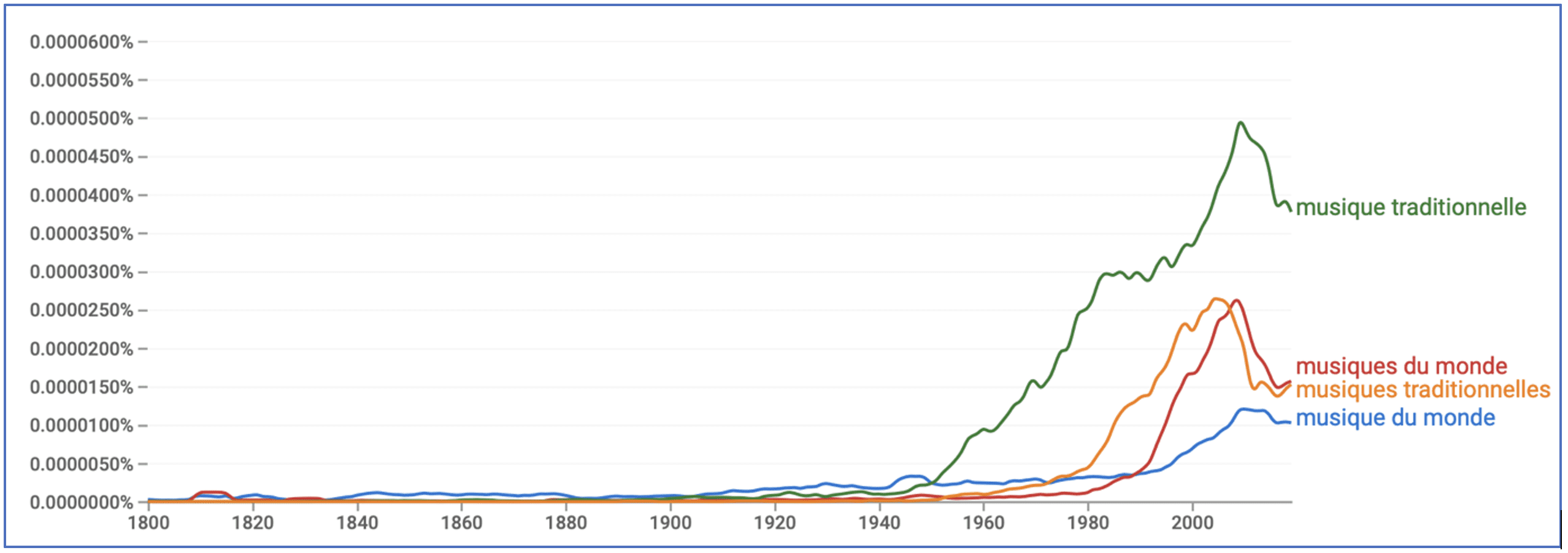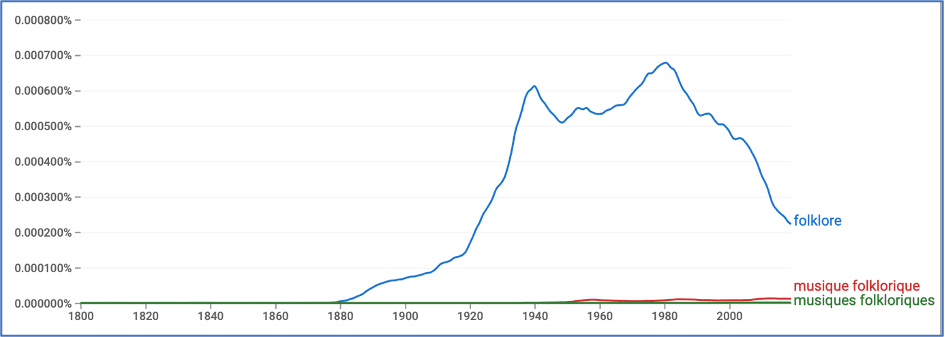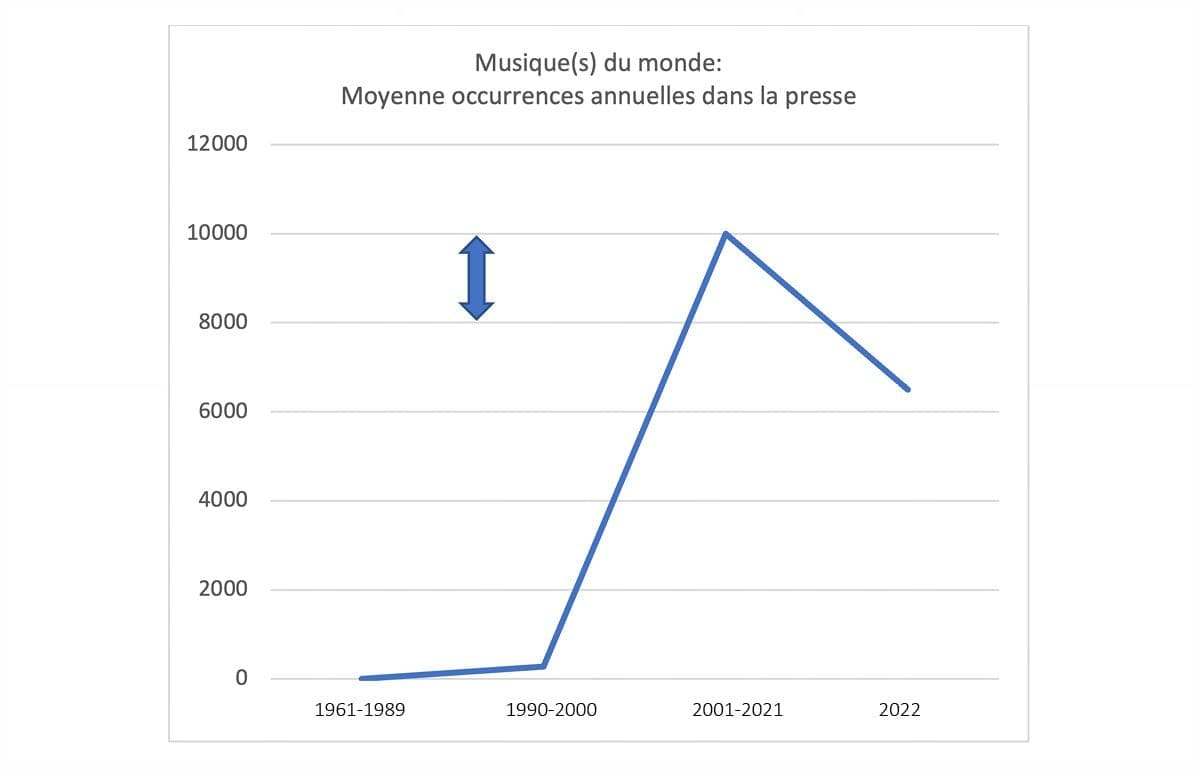(editor’s note) Challenged for its ethnocentrism and the legacy of colonialism and global capitalism, the term “world music” raises questions. Should we update our words, that carry, summon and shape our imaginations and our sensibilities ? Words that have consequences for the material conditions of creation, distribution and reception of the works produced.
Four articles open this reflection:
- a sociolinguistic point of view, with an investigation by researcher Philippe Blanchet
- a journalistic point of view with the analysis of Shiba Melissa Mazaza
- a musicological point of view, with a study by ethnomusicologist Marta Amico
- an artistic point of view, with a collection of testimonies from artists of different generations by Anne-Laure Lemancel.
« “It’s hard to see the point to which words, verbs and ready-made expressions are simply subliminal messages which end up indoctrinating our view of things » Besancenot, O., Petit dictionnaire de la fausse monnaie politique, Paris, éditions du Cherche-Midi, 2016, p. 7.
Recent, massive dissemination
The expression “world music” (WM) [musiques du monde in French] is relatively recent. It began to be used in a limited way in English by musicologists during the first half of the XXth century[1]. A search of the Google Books data base using the NGram Viewer[2] has shown that its use in English increased from 1960-1980 onwards and then exponentially from 1990. It was the same in the French language (diagram 1): probably translated from English around 1960, the expression began to be noticeable during the 1980s and exploded in 1990, only to decrease since 2008 (I’ll come back to that). In French, a variation in the singular [musique du monde] peaked at the same time, but more weakly (I’ll come back to that too). This curve is parallel to that of the use of the phrase traditional music, a notion often associated with world music and used almost twice as much.
1 : Search of the Google Books database by NGram Viewer

These two denominations were used, while at the same time as the use of the term folklore, borrowed from the English around 1880, where it means “popular culture”, was decreasing: an increase from 1880 to 1980, then a threefold decrease since 1980 (diagram 2). The use of the term folklore has always been quite restricted in French and has negative connotations which affect what it describes. Indeed, the Trésor de la Langue Française[4] [Treasury of the French Language] offers the following definitions: “Folklore: 1. A collection of the popular arts and traditions (of a country, region or human grouping). 2. A collection of the memories or subjects of conversation common to the members of a restricted human grouping). 3. (pejorative) Something which is facilely picturesque and devoid of gravity.” This largely explains why the term was abandoned for traditional, including when talking about other cultural practices such as dance or costumes, with which it is more often associated.
2 : search of the Google Books database by NGram Viewer

This dating of world music in French is confirmed by a search of the Europress database[5] over a vast collection of French written media since 1945: there, the use of this denomination has increased as follows: 25 times between its appearance in 1961 and 1989 (an average of 0.8 times/year), 2,744 between 1990 and 2000 (275/year), 100,210 between 2001 and 2021 (10,000/year), 3,215 from 01/01/2022 to 30/06/2022 (around 6,500/year).
Schéma 3 : Query of the Europress database - “World Music” average annual occurrences in the media

Beyond its quantitative presence, the notion of “world music” has been subject to gratifying recognition to the point of having been institutionalised. In France, for example, there is an International Institute of World Music (a private educational centre)[6] and a Regional World Music Centre in the Cité de la Musique in Marseilles, supported by local authorities (with association status)[7]. Most music academies (public bodies) have set up a “world music” section, which is also the classification used in media libraries and points of sale[8].
Several sources confirm that the sudden dissemination of the term, or even its invention, was due to a marketing operation launched in 1987: “In London, around twenty people, mainly independent record producers, got together at the initiative of Robert Armstrong and Ben Mandelson of the GlobeStyle label to define a new marketing campaign (rather than a philosophical idea). They agreed on the term world music; the creation of the Realworld label and the company behind the organisation of WoMad concerts followed.”[9] Among these people was the well-known English musician Peter Gabriel, often introduced as the founder of RealWorld and WoMad and whose work in this direction has been widely covered in the media[10].
A negative definition and some implied ones
Most sources consider the definition of the notion to be vague: “World music is a “catch-all” concept corresponding to the media coverage of popular forms of musical expression, the latter being themselves related to age-old traditions.”[11] “In an objective and pragmatic way, it could be said that “world music” is a motley collection of creative output arising from various principles, whose common thread is that they are linked to at least one musical reference identified as an integral part of the expression of a traditional culture”.[12] A clear, more detailed description was given by a Mediapart blogger:
- “A first categorisation distinguishes traditional music which is “primitive” or “ethnic” in nature from certain regions of the world which have suffered almost no outside influence. To this can be added folk music and songs performed by groups respecting tradition through the use of certain instruments or musical ensembles rooted in the region’s culture.
- A second, more blended categorisation includes music which may use folk instruments while being built on new rhythms or on non-traditional harmonic structures. To this can be added music mixing traditional and modern instruments, as well as the creative output of artists offering a blending of the musical styles from various cultures, different periods and bringing together traditional and modern instruments”[13].
Another way of defining the concept is by observing its concrete implementation in media classification. “What can still be found today in French record shops in the “world music” or “musiques du monde” categories? Recordings of purely traditional pieces attached to a particular region of France, one of its overseas territories or the world, some arising from scientific ethno-musicological study, works taken from large, scholarly collections of non-Western music (that of India, Persia, the Ottoman Empire, Arabia, Andalusia), contemporary performances of popular music acclaimed in their countries or regions of origin (the Caribbean, Africa, Brazil etc.) and current music resulting from mixtures and blending”[14]. A survey of two large record retailers has shown the use of various incoherent classifications: “The scale[15] of world music does not relate to its content, but to its recipient[16]”[17].
The say “world” is problematic because, in a general sense, all music is “of the world”. So we still have to decide what is “of the world” and what is not: “anything which does not belong to the fields found in (Western) classical music (including that known as contemporary), popular music (including pop, rock etc.) and jazz is classified under the heading “world music”.”[18] Without saying so, this idea presupposes that Western music, particularly modern, urban and industrialised music, is not rooted in the world, but is universal. It is laid down as a reference against which other musical forms are said to be “non-universal”, therefore “local” and thus relegated to a cultural grounding from which dominant forms of Western music (excluding regional traditional music) would be exempt. In addition, “the development of a problem with the term world music and its use in the plural in French, “les musiques du monde”, cannot save it from criticism as a marketing construction”[19].
The content of the concept appears therefore to have connotations of colonialism and capitalism.
Power relationships, inter-cultural alternatives and plundering
Many studies have demonstrated that the definition of the concept of “world music” has been built “in terms of hegemonic relationships driven by the “North” over countries in the “South”[20] and therefore “biased by the point of view of a Western, urban listener”[21]. Y. Raibaud observed that “world music producers and those who listen to it, who select it and are responsible for the sound of World Music mostly live in the large cities of the North and work there for Western audiences”[22]. One consequence of this definition of “world music” by those who are not at the start of it is that this music, in the genuinely traditional “first category” sense above is transformed into second category, Western-urbanised music: “The music industry muddies the waters, encourages blending and standardises ethnic productions to make them into products for the masses”[23]. As has been seen across the various musical sources grouped under the “world music” title, this colonialist-type domination[24] pursues two main lines: Western societies over other societies in the world (particularly those of the “South”), urban societies acquired using dominant standards over rural societies which have inherited “traditional” cultures (particularly those of the “North”).
The definition of “traditionally blended” or “traditionally-inspired modern” music is not negative in itself. On the one hand, because this approach can also arise from a true inter-cultural encounter on an equal footing, of open and respectful attention to other musical, and therefore cultural, expressions or even new ways of living together in one world and above all in urban societies where people from different social and cultural roots come together. This approach can be used by small-scale independent producers whose ethical value may carry more weight than the greed of large production companies. This is the view with which François Bensignor concluded his text significantly entitled “La revanche des autres” (“retaliation” in English)[25]. On the other hand, because the belief that what arises from a tradition is inevitably frozen comes also from colonialist disregard: “ethno-musicology, and also anthropology in a smaller measure, has for a long time ignored the idea of creation, as if non-Western, pre-colonial societies, its privileged ground, had thrived on the reproduction of community and ritual practices which stopped the emergence of any creative action”[26]. The phenomenon has been particularly witnessed in France, where “ethno-musicology has for a long time privileged the study of so-called traditional music, largely considering it to be “lost aesthetics” which were productive in the sense of the use of well-defined (small) societies, leaving the study of music deemed popular, urban, migrant or de-territorialised to the sociologists, carried by individual composers, authors and performers participating in a world economy of cultural assets”[27]. Its transformation, over time and through contact with other musical forms in other contexts, is part and parcel of traditional music and “we should refrain from giving way to an essentialist view of tradition”[28]. L. Aubert added that “’foreign shores’ and ‘performance’ can have positive effects”[29]. In this sense, both “world music” categories are not contrary to one another, but continuous from one to the other.
Where the notion of “world music” is flawed, however, and perhaps received as such, is when plundering occurs. Regarding the Western, urban audience with its dominant cultures, “the search for authenticity (…) is one of its main shortcomings: the Western listener is fascinated by the “original” purity of popular or ethnic music because he or she is often seeking something radically different.”[30]. This shortcoming can lead to various, and often cumulative, forms of expropriation.
There is the plundering of ownership, firstly, by seizing so-called “traditional” compositions which are therefore deemed, from a certain point of view, to have no author or to be in the public domain. The industrial commodification of these works can lead to symbolic recognition and/or considerable profits of which the people and/or communities which effectively created these works are deprived. It is precisely for this reason that “faced with a countless amount of pillaging and plundering to which the majority of indigenous peoples in the world have been victim - and which several still suffer - it was necessary to fix an international legislative framework contributing towards the defence of their rights. It was with this in mind that the legal notion of “collective intellectual property” was introduced”[31].
Next, the plundering of visibility. Schematically urban-modern-blended-assimilated Category 2 “world music”, supported by the industrial power of marketing and dissemination by the large “major retailers”, occupies the major share or even the entirety of the space for the public expression of “world music”, to the detriment of that in Category 1. Indeed, “whether it appears in an “authentic” form, in a folked-up version or dressed-up to be openly modern responding to the demands of transcultural world music (…), music then becomes a product for consumption which, like any other, is then subject to market forces”[32]. And in the ferocious competition of the capitalist marketplace, “world music” has an enormous disadvantage over “world music 2” which then contributes to its further marginalisation. Thus, “a lot of musical heritage is disappearing in front of our eyes - or rather our ears - and it is urgent and necessary to collect the last traces of it, if only to retain some memory of it”[33] — or to recognise its rights and grant it the means to survive.
Finally, the plundering of identity, because “the problems relating to intellectual property are included in a much wider debate, also revolving around a people’s self-determination, their rights to land and ecological questions”[34]. This urban-modern-blended-assimilated “Category 2 world music” ends up being the only music perceived or claimed as the custodian or representative of specific cultural identities, substituting schematically rural-traditional-authentic-marginalised “Category 1 world music”. Category 2 “world music” is showcased and received as being “an exoticism which claims authenticity” but which “is rooted in a purely aesthetic construction of otherness”[35] rather than being anchored in historical or geographical experience. Artists from dominant spheres therefore claim “to go traditional” by transforming, deforming, even inventing musical practices and as far as the language in which the lyrics are sung or even the designations in lieu of these peoples and their authentic cultural practices. “Cultural identity is not a question of authenticity, but authority: who has the authority to say identity?”[36]. The answer is unfortunately well-known: authority is always held by the most powerful, in this case by Category 2 “world music” and by its mass audience rathe than by Category 1 “world music” and the groups, underestimated in many ways, which support it. In this sense, the over-reaching notion of “world music” participates in “the loss or breakdown of social ties, territorial and community rationales and musical idiosyncrasies to the benefit of marketing subject to the single, massive commercial world music label”[37].
This plundering therefore drains the notion of “world music” of part of its meaning and completely re-directs it. Faced with the difficulties overlain by this designation, its limits and derivatives, the criticism which can be laid on its, its usage began to decrease from around 2008 (cf diagram 1). The notion of traditional music, which as seen above also retains some less pejorative ambiguities, has remained more widely used in French (musique(s) traditionnelle(s)) and could impose itself in the end, including in inflected or specified forms, such as folk music[38], trad music or, more originally, as ghetto-folk[39]. In social contexts, there is no neutral and independent designation. And words are important.
This dossier is only a beginning and we do not claim to answer all the questions it raises, nor to close this debate. It is intended to be fed and enriched by other perspectives. Do not hesitate to contact us if you wish to contribute to the debate or if you wish to hear another opinion! (editor’s note)
[1] Besancenot, O., Petit dictionnaire de la fausse monnaie politique, Paris, éditions du Cherche-Midi, 2016, p. 7.
[2] Selon Wikipedia, toujours à contre-vérifier, « Le terme Weltmusik fut employé pour la première fois en 1906 par Georg Capellen, un musicologue allemand, alors qu’il rêvait d’un nouveau souffle pour la musique occidentale trouvé à partir d’emprunts ou de mélanges d’éléments exotiques ou orientaux » (https://fr.wikipedia.org/wiki/Musiques_du_monde).
[3] https://books.google.com/ngrams
[4] http://stella.atilf.fr (CNRS).
[5] http://www.europresse.com/fr/bibliotheque-denseignement/
[7] https://www.citemusique-marseille.com/pole-musique-du-monde/
[8] Par exemple sur https://fr.statista.com/infographie/27392/genre-musique-preferes-en-france-pourcentage-auditeurs/
[9] F. Picard, « Le point de vue critique de l’anthropologie musicale » dans Jean During éd., La musique à l’esprit : Enjeux éthiques du phénomène musical. Paris, L’Harmattan, 2008, p. 115-122 (https://www.cairn.info/la-musique-a-l-esprit--9782296061835-page-115.htm#no2) qui ajoute en note : « L’histoire est désormais (2007) bien documentée : voir Ian Anderson, « World Music History », fRoots 201, mars 2000 (http://www.frootsmag.com/content/features/world_music_history/). La première mention de cette histoire est due à Ronnie Graham, Stern’s Guide to Contemporary African Music, London, Zwan Publications, 1988 ». Information identique chez F. Bensignor « Musiques du monde ou “World Music”, la revanche des “autres” », Hommes et Migrations, 1221, 1999, p. 56-68 (https://www.persee.fr/doc/homig_1142-852x_1999_num_1221_1_3384).
[10] https://worldmusiccentral.org/2017/11/04/artist-profiles-peter-gabriel/ ; https://realworldrecords.com/artists/peter-gabriel/
[11] E. Lledo, « World music et musiques du monde », Encyclopædia Universalis,
[12] F. Bensignor. Musiques du monde ou “World Music”, la revanche des “autres”. In: Hommes et Migrations, n°1221, Septembre-octobre 1999. Immigration, la dette à l’envers. pp. 56-68,
[13] https://blogs.mediapart.fr/edition/musiques-du-monde/article/231116/musiques-du-monde-au-pluriel-sil-vous-plait
[14] F. Bonsignor, op. cit. p. 58.
[15] C’est-à-dire ici « l’ampleur ».
[16] C’est-à-dire aux clients, dans ce cas à Bordeaux.
[17] N. Jaujou, « Comment faire notre Musique du monde ? », Cahiers d’études africaines 168, 2002, ici p. 860.
[18] « Les « musiques du monde » : Imaginaires contradictoires de la globalisation ». Dans : Denis-Constant Martin éd., Sur la piste des Objets Politiques Non Identifiés (pp. 397-430). Paris, Karthala.
[19] N. Jaujou, op. cit., p. 865.
[20] E. Olivier, « Ethnomusicologie, création musicale et globalisation »,
[21] Y. Raibaud, « Les Musiques du monde à l’épreuve des études postcoloniales », dans Géographie, musique et postcolonialisme, 2008, http:// journals.openedition.org/volume/167, p. 5.
[22] Y. Raibaud, ibid., p. 8.
[23] Y. Raibaud, ibid., p. 9.
[24] On peut définir l’idéologie colonialiste comme la croyance dans la supériorité d’un groupe humain et de ses attributs (culturels, linguistiques, économiques, politiques…) qui le constitue en modèle, en référence, et qui justifierait l’exercice de sa domination, y compris censément « pour le bien » des autres humains.
[25] François Bensignor, op. cit.
[26] E. Olivier, op. cit., p. 7.
[27] E. Olivier, op. cit., p. 10.
[28] L. Aubert, « Du ‘’bon usage’’ des musiques du monde. Questions sur une éthique de la diversité culturelle ». Les Cahiers de la Société québécoise de recherche en musique, 11(1-2), 21–29. https://doi.org/10.7202/1054020ar, p. 22.
[29] L. Aubert, op. cit., p. 26.
[30] Y. Raibaud, op. cit., p. 5
[31] L. Aubert, op. cit., p. 23.
[32] L. Aubert, op. cit., p. 26.
[33] L. Aubert, ibid., p. 23.
[34] L. Aubert, ibid., p. 23
[35] E. Olivier, op. cit., p. 11.
[36] Y. Raibaud, op. cit., p. 6.
[37] E. Olivier, op. cit., p. 11.
[38] Parfois comprise comme réduite au folk états-unien.
[39] https://vladlabel.bandcamp.com/merch


